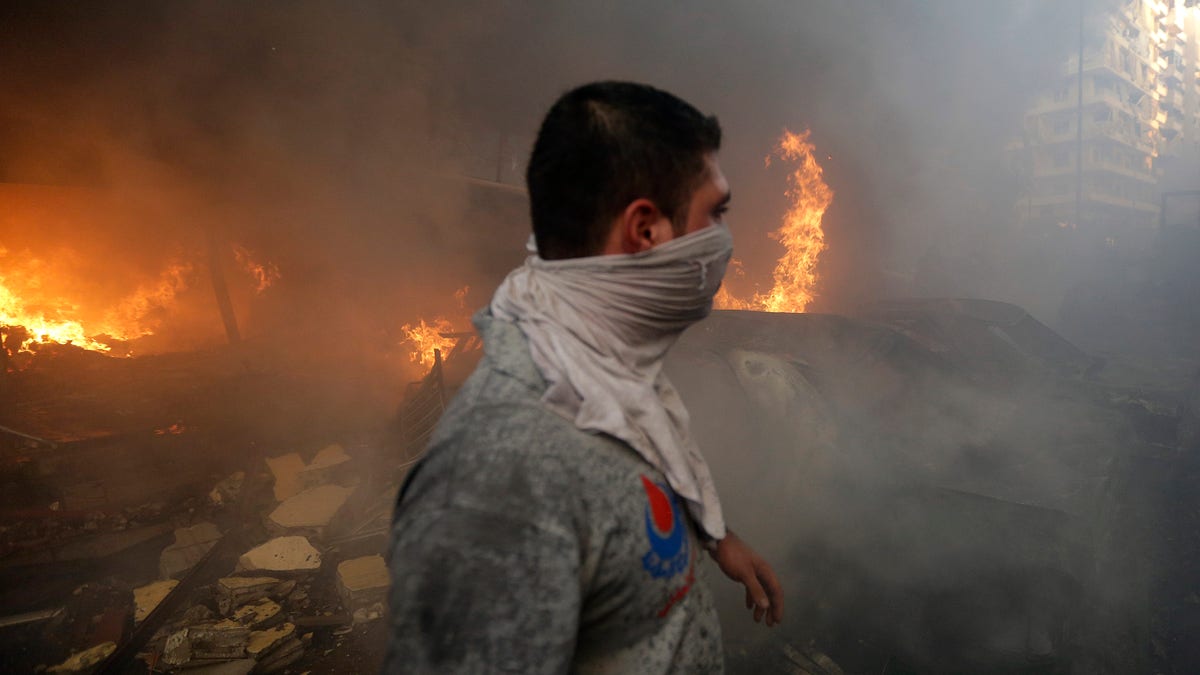
A Hezbollah civil defense worker walks past a burned car at a car bomb in the southern suburb of Beirut, Lebanon, Thursday, Aug. 15, 2013. (AP2013)
As Iran and Venezuela become increasingly isolated and sanctioned by the U.S and much of the international community, the two governments are said to be tightening their bond - with the help of Tehran's proxy group, Hezbollah, in the middle of the action.
"Training between Iran and Venezuela has increased in the past few years as part of a larger plan between the Venezuelan regime, consisting of increasing the number of Hezbollah operatives and their supporters across Latin America,” Johan Obdola, President of the Canada-based Global Organization for Intelligence (IOSI) and former counter-narcotics chief in Venezuela, told Fox News. “(Hassan) Rouhani and (Nicolas) Maduro have established a very firm and close relationship, which was of course initiated by (Hugo) Chavez.”
Venezuela’s connections to Iran – and by default its proxy militia, Hezbollah – go back more than a decade. Hezbollah, which translates to “The Party of God,” is an Iran-backed, Shiite-dominant political and military group that began in Lebanon in 1982, following the Israeli occupation. It was designated a foreign terrorist organization by the U.S State Department in 1997.
But perhaps most crucially, according to analysts and experts, is that Iran and Hezbollah are said to provide “strategic advice” to the Venezuelan regime “for safe keeping.”
“It has been proven that the Venezuelan government has ties to international terrorist groups. Therefore, what it is being requested is that the Venezuelan government be recognized as such; a regime that has brought the Venezuelan State to a failed status,” said former political prisoner and mayor of Caracas, Antonio Ledezma. “It is a rogue state. This is due to its ties with the drug traffic, due to its engagement in human rights violations, and because of its ties to international terrorism.”
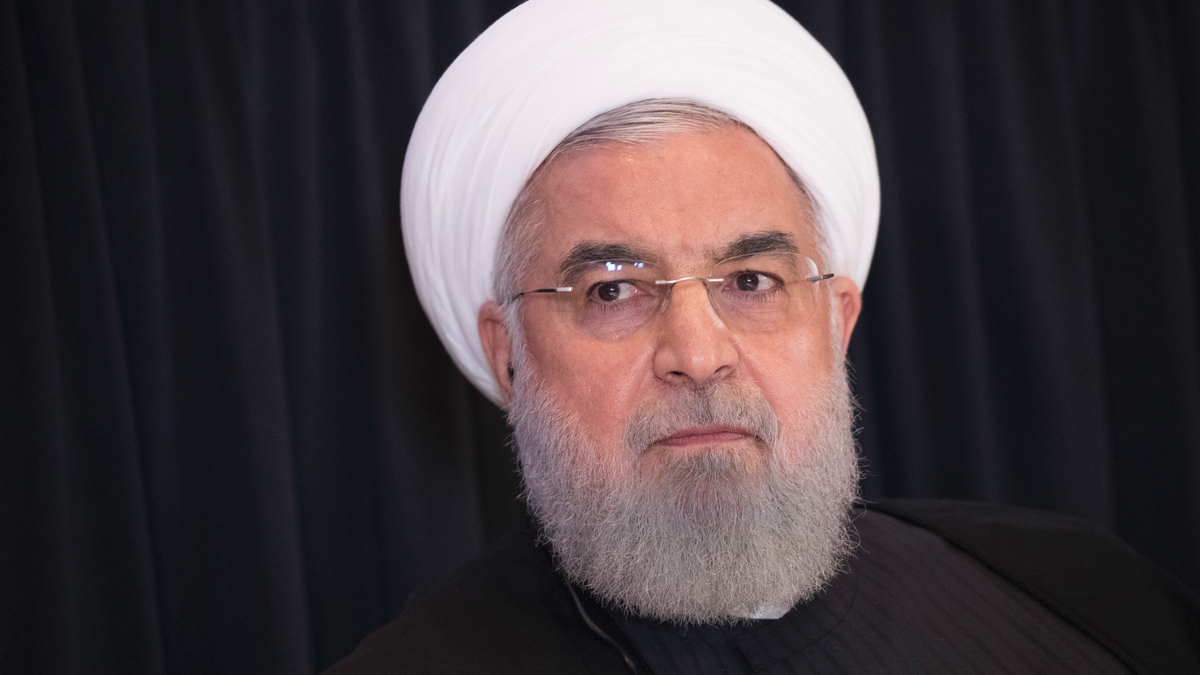
FILE - In this Sept. 26, 2018, file photo, Iranian President Hassan Rouhani speaks during a news conference in New York. President Rouhani is warning Western countries that they will face a massive influx of drugs if Iran becomes weakened by U.S. sanctions. Rouhani spoke in Tehran on Saturday, Dec. 8, 2018, at a six-nation conference on fighting terrorism attended by parliament speakers of Afghanistan, Iran, Pakistan, Turkey, China and Russia. (AP Photo/Mary Altaffer, File)
The links between the countries and the terrorist outfit are said to conjoin in an array of ways.
“Iran and Venezuela at one point even had an agreement to build bicycles. The Iranian government wanted to use Venezuela to make bicycles. A little crazy,” Venezuelan opposition leader Julio Borges, who has been living in exile in the Colombian capital of Bogota for the past 10 months, told Fox News in an interview. “Hezbollah enjoys a kind of impunity in Venezuela too. They get Venezuelan documents and passports. And they can live and operate freely on the East side of the country.”
Investigations in recent years have also revealed Venezuelan officials have directed schemes to sell passports to foreigners in the Middle East. In 2015 testimony given by an adviser to the Venezuelan embassy in Iraq, Misael Lopez Soto, the government is alleged to have delivered diplomatic documents to terrorists in the Middle East. Embassy employees were also said to have sold visas, passports, identity cards and Venezuelan birth certificates to those in the region who can pay between $5,000 and $15,000.
Moises Rendon, associate director of the Center for Strategic and International Studies (CSIS) Americas Program, also pointed out to Fox News that links between Iran and Venezuela remain potent and have long been cemented – with the murky mystery of Iran Air flights still unsolved. “There was a direct flight daily from Caracas to Tehran. No one really knew what was on those airplanes,” Rendon said. “There was no transparency.”
The “mystery” flight that shuttled between Venezuela, Syria, and Iran for three years – which was listed as a commercial route, yet no tickets were available for purchase without government vetting – was abruptly canned in 2010, amid a growing chorus of accusations that it was being used to move spies, terrorist and deadly cargo among the persona non grata nations.
There has also been close military cooperation among Venezuela, Iran and Hezbollah. Beginning around 2012, Iran’s elite counter-terrorism unit, the Quds Force, started ramping up its irregular warfare Latin America training program – often using Hezbollah operatives to train both the Venezuela military and Colombia’s FARC rebels. Quds Force-based operatives were also believed to be placed inside Iranian embassies and within religious institutions.
The Quds Force was especially present within Venezuela’s National Guard, “providing assistance to the regime for keeping the opposition at bay,” according to analysts. The group also targeted youth of Muslim origin for recruitment.
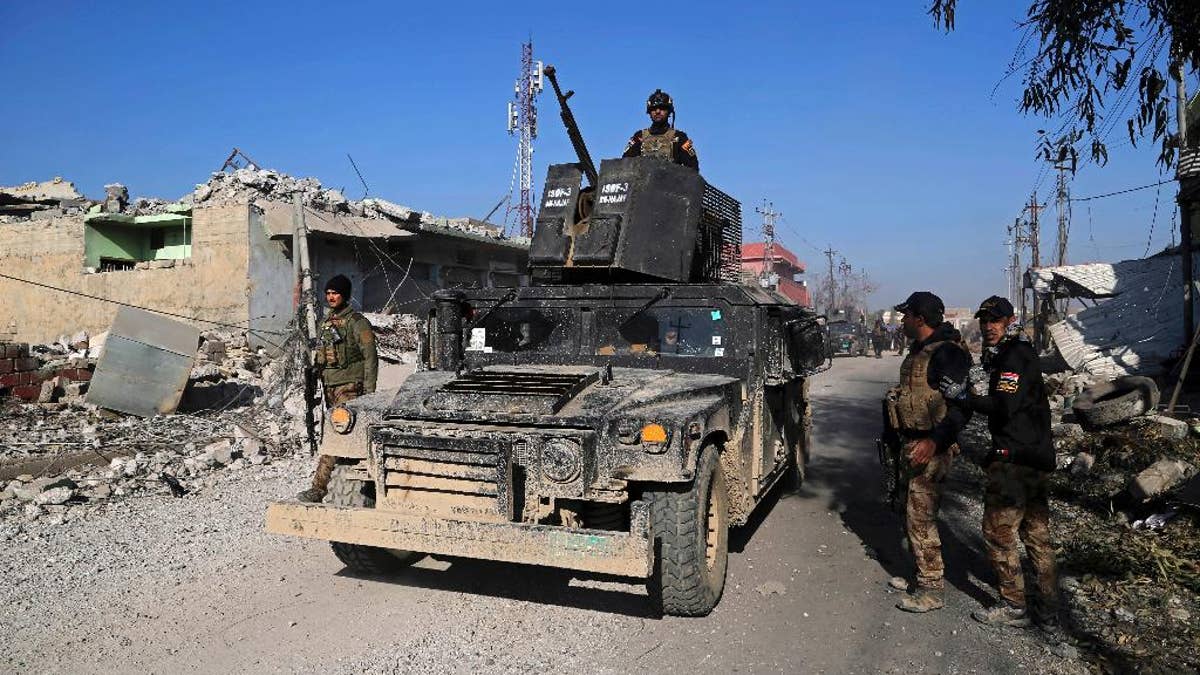
Iraq's elite counterterrorism forces inspect defenses after regaining control of the Quds neighborhood of Mosul, Iraq, Monday, Jan. 2, 2017. (AP Photo/ Khalid Mohammed) (The Associated Press)
Some intelligence officials now believe recruits in Venezuela first receive “indoctrination that can last months,” and are sent to undisclosed “secondary” training camps across the country to receive training specific to urban combat.” They are then shipped to “primary” facilities – sometimes off-shore – for higher -evel training. Dozens of recruits are also sent to Iran, rotating in groups of 10-20 every two to three months, according to Obdola.
In a video viewed by Fox News, ostensible relatives of Iran’s Mohsen Rabbani can be seen “sending a message to Venezuelan followers” in Spanish, which is alleged to be part of the inter-country training. Rabbani has been accused of being the mastermind behind the 1994 AMIA terrorist attack on the Jewish community in Argentina that killed 85 people.
Venezuela has also long been deemed a facilitator to assist Iran in evading sanctions – with the two countries coordinating to develop an array of business enterprises, financial institutions and religious foundations to launder Iranian money and solicit technology – dating bate to the Hugo Chavez and Mahmoud Ahmadinejad days.
A crucial pillar of the relationship was to spread anti-American sentiment across Latin America. Yet tensions between Venezuela and neighboring countries like Colombia have long been at odds over Venezuela’s suspected sanctions-evading support for Iran, especially through weapons exports and trades between the countries.
A year earlier, U.S. intelligence reports indicated the two governments had established a “National Geoscience Database” with the intention to survey mineral deposits in Venezuela, prompting alarm it could be the restart of a uranium program. The current status of the program remains unclear.
“Iran sees Venezuela as a fellow sufferer of the U.S.,” one intelligence source focused on Iran told Fox News. “They know the tradecraft of evading sanctions, so they can pass that information on.”
According to the source, the capabilities between the two pariah countries comes from “synergizing” their economies and leveraging one another’s skills and assets. Sources also pointed out the “tunnels” typically used in the region for narco-terrorist purposes are “not surprisingly similar” in structure to those constructed in the Middle East by Iranian-backed groups, Hamas and Hezbollah.
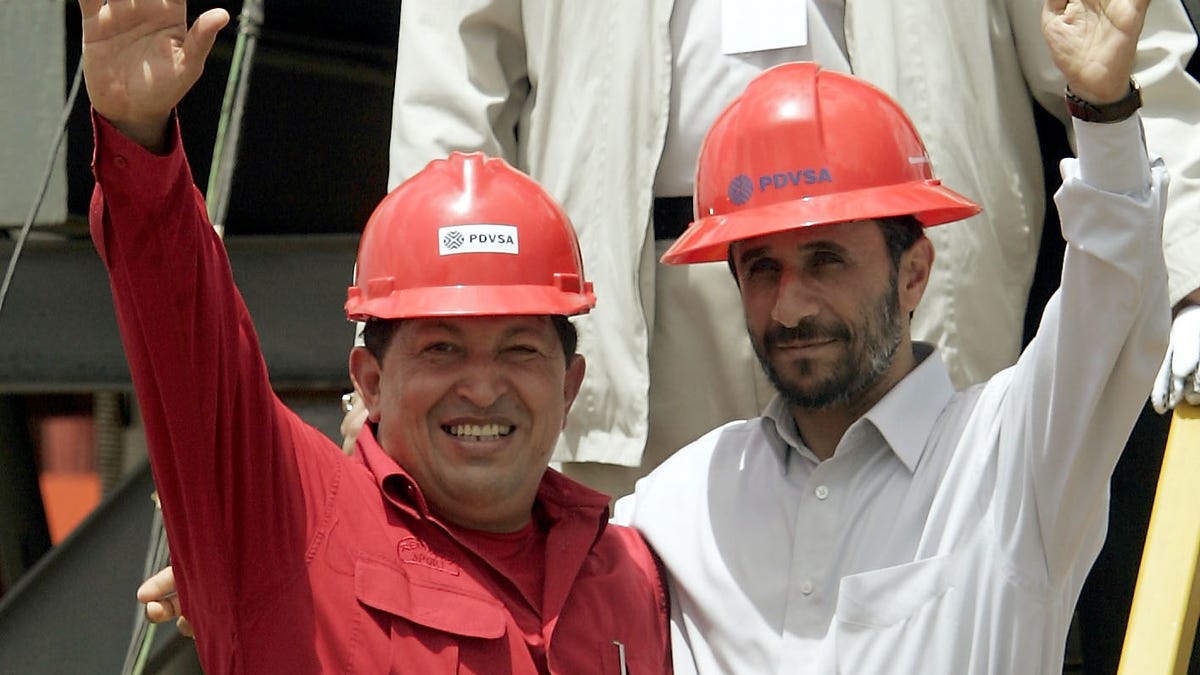
FILE - In this Sept. 18, 2006 file photo, Venezuela's President Hugo Chavez, left, and Iran's President Mahmoud Ahmadinejad wave to the press after inaugurating an oil drill in San Tome, Venezuela. Venezuela's Vice President Nicolas Maduro announced on Tuesday, March 5, 2013 that Chavez has died. Chavez, 58, was first diagnosed with cancer in June 2011. (AP Photo/Fernando Llano, File) (AP2006)
The leaders of both countries also share the commonality of continuing to accuse the United States of plotting regime change against them. While sanctions against Iran were reinstated last year after President Trump pulled the U.S out of the JCPOA, better known as the Iran Deal, Venezuela faced an increasing number of sanctions as the country's economy continued to crumble.
Around 2009, Venezuela is also said to have started offering Iran contracts to build low-income housing, even though the tenders coming from within Venezuela’s own private sector were half the cost. Iran in 2010 established the Banco Internactional de Desarrollo in Caracas as the first “non-governmental bi-national bank in Iran,” with its financing deemed to be of “mutual benefit to both countries.”
But the U.S Department of Justice last year claimed that some of the money used in the housing scheme went to purchase property in California, in violation of the trade embargo on Iran, according to a criminal indictment in New York federal court. Iranian national Ali Sadr Hashemi Nejad, who also had a passport to the Caribbean island of Saint Kitts, was indicted in March on numerous counts for the alleged violation.
Scores of Venezuelan individuals have also been flagged by the U.S. in recent times for having direct terrorist ties. In early 2017, Maduro appointed
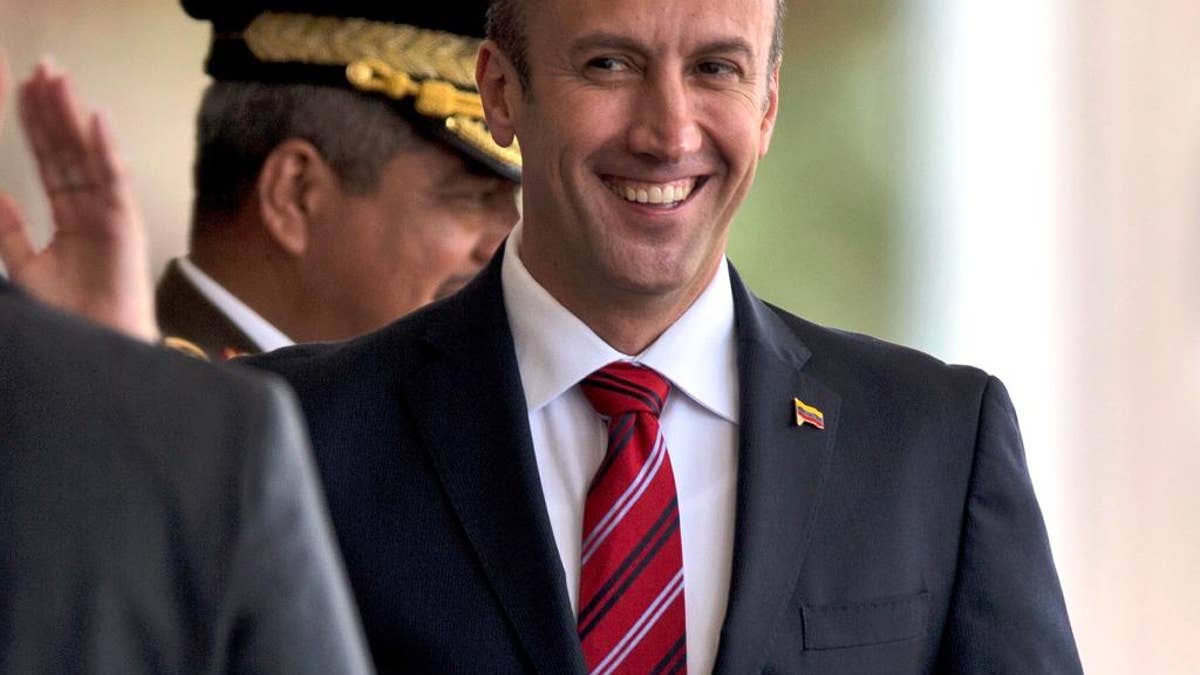
FILE - In this Feb. 1, 2017 photo, Venezuela's then-Vice President, Tareck El Aissami, right, is saluted by Boilivarian Army officer upon his arrival for a military parade at Fort Tiuna in Caracas, Venezuela. (The Associated Press)
to be his Vice President, and thus relegated to the critical role of overseeing the country’s Intelligence Service. According to one Venezuelan intel source, Aissami – born to a Lebanese mother and Syrian father – is one of the wealthiest men in the country, and for years has been under investigation by U.S. prosecutors for having close connections to Hezbollah and financing from their drug trafficking.
Aissami remained in the second-in-command role until June of 2018, when he was shuffled to the position of Minister of Industries and National Production. But “Tareck is the most powerful official of the Venezuelan regime in charge of all the support, financing and expansion of Hezbollah in the Hemisphere,” Obdola said.
There are others said to be involved in the Venezuela-Iran connection. Aissami's brother, Feras El Aissami, is believed to have moved to Uruguay last year, closer to the coveted “tri-border” area for drug trafficking operations.
Then there is Ghazi Nasr Al-Din, a Lebanese national who became a Venezuelan citizen in 1998. He is wanted by the FBI for questioning regarding his alleged “fundraising efforts” with Hezbollah contributors. Al-Din, a former Venezuelan diplomat who served in their Syrian embassy, reportedly met with Hezbollah officials in Lebanon to “discuss operational issues,” beginning around 2006. Al-Din reportedly also sought donations for Hezbollah, and announced the opening of a Hezbollah-sponsored community center and office in Venezuela, according to the FBI. He later moved on to the Venezuelan embassy in Beirut.
Some Venezuelan intelligence experts say relations between the two countries “peaked” during the reigns of Hugo Chavez and Mahmoud Ahmadinejad – both of who were out of office by 2013. But Iran is said to have affirmed its stronghold in Venezuela in the years since.
Victor Mr. Mijares, a Venezuelan political scientist and assistant professor of political science of Los Andes University, Colombia, said the Iran-Venezuela relationship went through its “golden age” in the last years of Chavez’s life, which ended almost six years ago. According to Mijares, both Chavez and Ahmedinejad shared “common geopolitical objectives, and identified the United States as the main enemy.”
“After Chavez’s death, the relationship cooled down. But today, Iran remains an important ally of Venezuela in Eurasia and within OPEC, but its ties with China and Russia have been strengthened, and now Turkey is becoming much more important to the Maduro regime,” Mijares said. “But it is in the interest of the Venezuelan government to disassociate itself from the West and from Latin America, turning Venezuela into a Eurasian enclave in the Americas and thus not be punished by the diplomatic and economic hemispheric mechanisms. Hezbollah is supposed to be an ally in reaching that goal.”
IN VENEZUELAN CRISIS, FAMILIES CAN'T EVEN AFFORD TO PROPERLY BURY THE DEAD
COLOMBIA’S PEACE AGREEMENT BLOODIED BY DISTRUST, DRUGS - AND THE VENEZUELAN REGIME
Indeed, other areas of Latin America, outside of Venezuela, have interacted with Hezbollah.
In December, Deputy U.S Secretary of State John Sullivan cautioned that several Latin American countries are being forced to face “regular” terror plots at the behest of Hezbollah. U.S authorities consider the tri-border (TBA) region – comprised of Argentina, Brazil, and Paraguay – as a refuge for transnational crime and terrorist organizations. The area is often characterized as the most important Hezbollah base of operation outside of Lebanon.
Sullivan’s warning came just weeks after the leading counterterrorism official at the State Department, Nathan Sales, told lawmakers Hezbollah has developed “large caches of military equipment and explosives” in Bolivia, in addition to sending operatives to Peru.
Meanwhile, Colombian police in 2017 arrested Abdala Rada Ramel in Cartagena, a Lebanese national traveling with Venezuelan identification who was "a key coordinator of the drug trafficking from Venezuela, Colombia, via the Caribbean to Africa," according to Obdola. “In the Tri-border area, Hezbollah, along with other criminal and terrorist groups move approximately $43 billion a year from drugs, the weapons trade, and human smuggling/prostitution.”
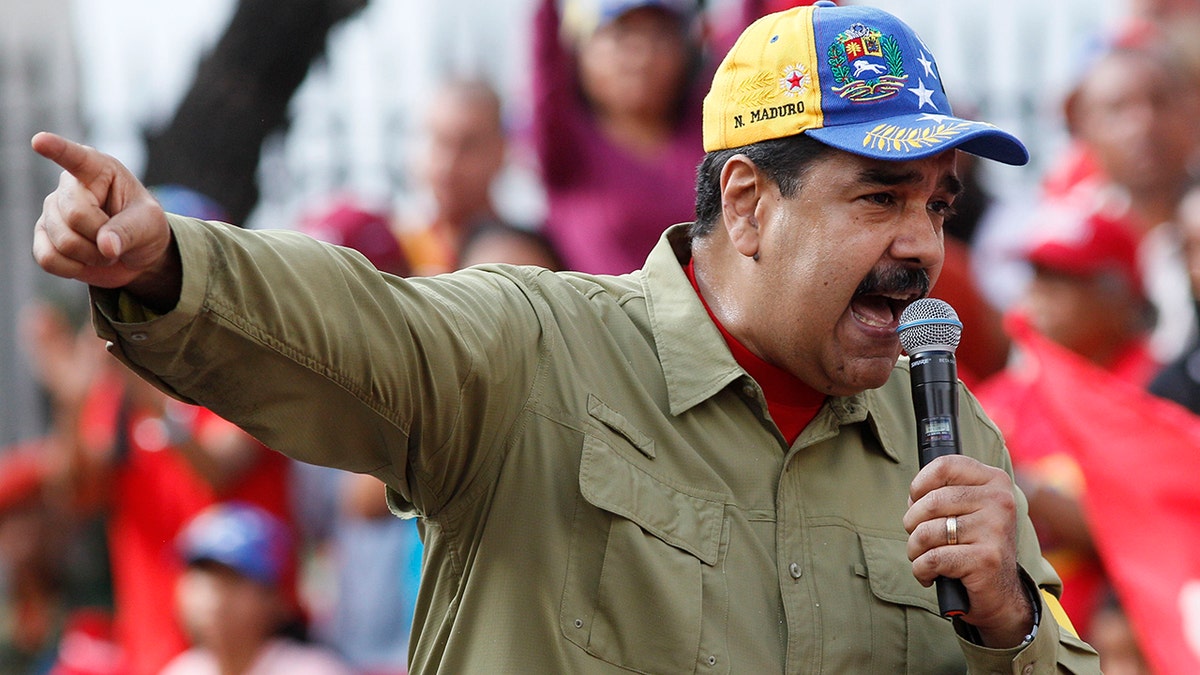
Venezuela's President Nicolas Maduro has repeatedly refused to accept aid into the country amid shortages of food and medicine. (AP)
Forbes last year designated Hezbollah as the world's wealthiest terrorist outfit, with an estimated annual income of $1.1 billion, earned largely by “aid funding from Iran, drug manufacture and trade.”
“The Venezuelan regime has been providing assistance to Hezbollah since 2005. The assistance started by facilitating Venezuelan IDs, including passports to Hezbollah operatives and later on they started bringing Hezbollah operatives to Venezuela and from there they travel to destination countries in Central and South America,” Obdola explained.








































